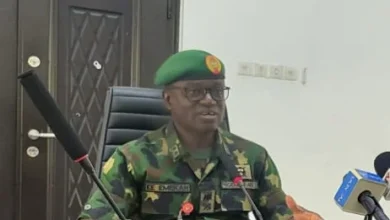Anambra: NSCDC Arrests Suspected Scavenger Destroying Public Utilities
Anambra: NSCDC Arrests Suspected Scavenger Destroying Public Utilities

A 25-year-old suspected scavenger has been arrested by the Anambra Command of the Nigeria Security and Civil Defence Corps (NSCDC), for allegedly destroying public utilities in the state.
The state Commandant of the corps, Olatunde Maku, disclosed the development on Thursday in Awka.
Maku said that the suspect was apprehended at Silas Street, Fegge in Onitsha, on Tuesday.
According to him, the arrest was in collaboration with the operatives of AVG security network in Onitsha South Local Government Area of the state.
“On March 4, one 25 years old man from Misau town, in the Misau LGA of Bauchi State, was apprehended while destroying and breaking the walls of a gutter and pulling out the iron rods, with intent to sell them as scrap.
“The suspect has confessed to the crime and admitted to vandalism multiple metal objects and selling them in separate transactions to a scrap vendor.
“However the Investigation department of the command is still conducting investigations and as soon as they are concluded, the suspect will be charged to court.’’
The commandant warned iron scavengers, commonly known as ‘Ndi Akpakara,’ to stop vandalising public and private property in the state or risk facing serious legal repercussions.
“NSCDC will continue to work to ensure that those involve in destroying public utilities, private property and vandalism critical national assets both in the state and local governments are brought to justice.
“Their collaborators including those buying or selling the vandalised materials will not be spared.
“We are out to stop the activities of those who want to sabotage and destroy property belonging to either government or individuals,” he said.
Source: NAN




